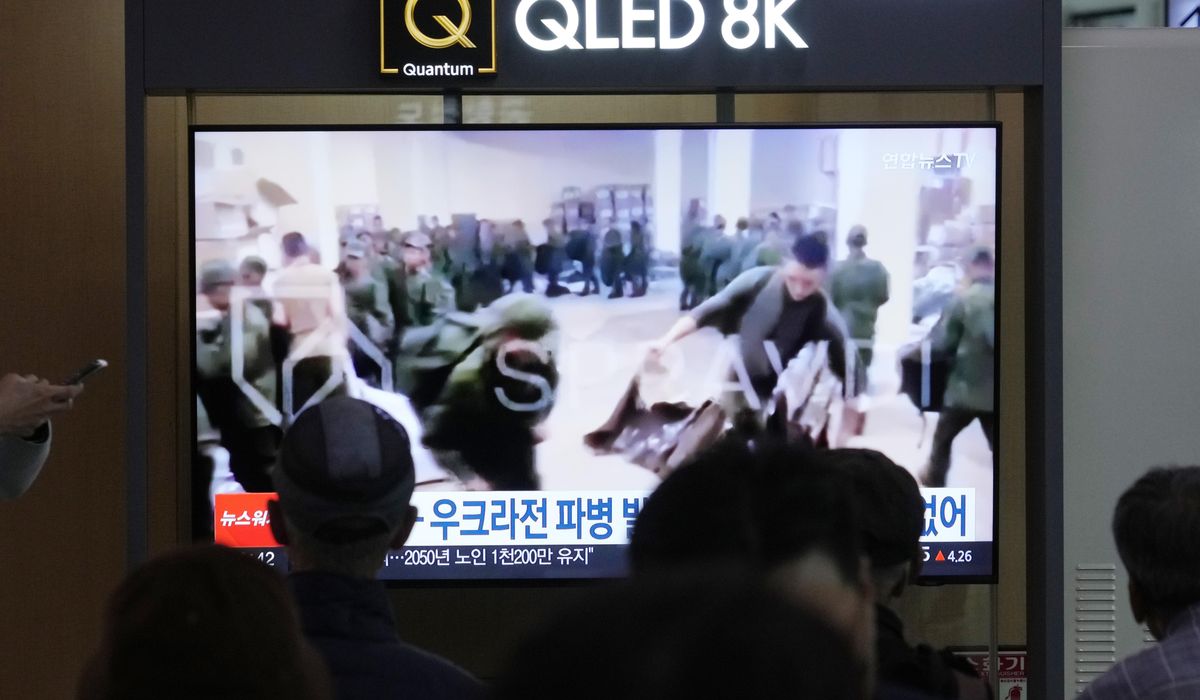


SEOUL, South Korea | South Korea’s intelligence agency confirmed Sunday that it is assisting Kyiv in interrogating two North Korean soldiers captured by Ukrainian troops in Russia’s Kursk region.
According to South Korea’s Yonhap News Agency, one of the prisoners of war said he thought he was on a training mission in Russia, not fighting against Ukraine, the Security Service of Ukraine (SBU) said.
The SBU announced the North Koreans’ capture on Saturday, saying it provides “irrefutable evidence” of Pyongyang’s involvement in the war. The SBU is holding the two prisoners of war, who are receiving medical attention, the Kyiv Independent reported.
The prisoners speak only Korean and are being questioned with the help of Korean translators and South Korea’s National Intelligence Service, the SBU said.
Photos released by the SBU showed two Asian men — one with a jaw wound, the other with apparent hand/forearm injuries. Both were unshaven but appeared well fed.
One, born in 2005, was a rifleman who had expected to undergo training, but not combat, in Russia. The other, born in 1999, was a scout/sniper, according to the SBU. One had military papers identifying him as a native of Russia’s Tuva district, close to Mongolia.
The two were captured by paratroopers and special forces of Tactical Unit 84 in Russia’s Kursk Oblast, where Ukrainian troops established a lodgment in August and is the scene of heavy fighting.
Drone footage showed part of the operation. Ukrainian troops under tree cover are seen evacuating one of the wounded men via stretcher over a razor-wire barrier and out of the combat zone.
“This task was not easy,” Ukrainian President Voloydmyr Zelensky said Saturday, according to Ukrainian media.
Mr. Zelenksy has sought to make political capital out of the presence of North Korean troops in a European war as he seeks to replenish his armory with foreign weaponry and munitions.
Some 12,000 North Korea troops have reportedly been fighting for Russia since late November.
Despite photographic and drone footage of Asian soldiers, combined with satellite intelligence and signals intercepts about troop movements, physical evidence of North Korean presence has not been proven.
Ethnically Asian Russians — Buryats, Siberians, Tuvans and even members of the country’s Korean minority (“Korietz”) — are widely represented in Moscow’s forces. Chinese mercenaries also are reportedly fighting on the Russian side.
Mr. Zelensky has made multiple references to the presence of the North Korean troops and their purported casualties. Capturing live North Koreans has become a priority, and special forces units have been deployed on rendition missions.
An earlier operation succeeded, but the captor died of his wounds on Dec 27, Ukrainian officials said.
Mr. Zelenksy claims that ruthless measures are being conducted by Moscow and Pyongyang to ensure that none are taken alive.
“Usually, Russia and other North Korean military personnel finish off their wounded and do everything possible to ensure that no evidence of the participation of another state — North Korea — in the war against Ukraine is preserved,” he said.
South Korea is familiar with North Koreans committing suicide to prevent capture, such as the operatives who blew up the South Korean Cabinet in Rangoon in 1983, and infiltrators in two mini-submarines that lost propulsion off South Korea’s coast in the 1990s.
North Koreans know their families back home will face punishment if they are captured. Nonetheless, some captured operatives have become fonts of information.
In 1968, Kim Shin-jo, the second-in-command of a commando platoon sent to assassinate the South Korean president, was captured amid a furious firefight. In debriefing, he offered plentiful information on North Korean special operations and spoke widely to the media.
In 1987, Kim Hyon-hui, a North Korean agent/terrorist who had bombed a South Korean airliner, was captured in Bahrain. She turned under interrogation and eventually wrote a book on her conversion.
Sources have told The Washington Times that other captured North Koreans, including naval commandos, have worked for South Korea.
“It is hard to capture them, but once captured alive, it is human nature that self-preservation kicks in and they become quite cooperative” said Chun In-bum, a former South Korean special forces general. “There is nothing more powerful than the truth: In our case, we just put them in a car and drove them through Seoul and they were shocked at what they saw. They had been lied to all their lives.”
“You start with name, rank, date of birth, unit, what your military occupational specialty is, and you would ask about chain of command,” said Bob Collins, a former U.S. Army interrogator of North Korean personnel. “The most important thing to me would be the process of integration with Russian troops: What instructions did you have? What disadvantages did you experience? What surprised you?”
The latter could provide actionable intelligence for use on the battlefield.
“Integration with the Russians would be a vulnerability you could exploit,” said Mr. Collins, who has also worked alongside South Korea’s NIS.
There are proven methods for extracting information.
“It is easy to manipulate them: You focus on breaking them down psychologically and then once they break, they are open,” Mr. Collins said, “Especially if you offer something beneficial, such as Ukrainian citizenship, so they never have to go back to North Korea.”
On the global political front, the prisoners could offer value to Mr. Zelensky.
“It is very important that he has got real hard evidence, that is a great tool,” said Mr. Chun. “South Korea is paralyzed by this martial law thing, so I don’t think we will do much, but for the international community, it shows another facet of what North Korea is to the world.”
• Andrew Salmon can be reached at asalmon@washingtontimes.com.
